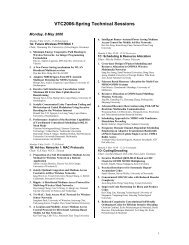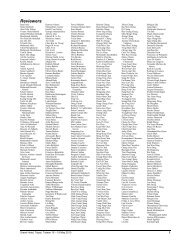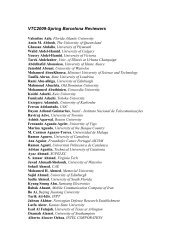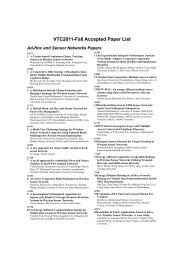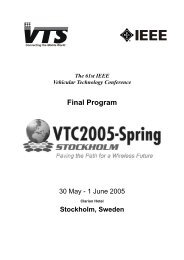Final Programme 2 â 5 June 2013 Dresden, Germany - ieeevtc.org
Final Programme 2 â 5 June 2013 Dresden, Germany - ieeevtc.org
Final Programme 2 â 5 June 2013 Dresden, Germany - ieeevtc.org
You also want an ePaper? Increase the reach of your titles
YUMPU automatically turns print PDFs into web optimized ePapers that Google loves.
the LTE SAE Trials Initiative (LSTI) as NECs Board member.<br />
Simon is the Industrial Chairman for the MVCE Green Radio<br />
<strong>Programme</strong>, a Director of mVCE and the ICT-KTN. In the past<br />
Simon has worked on behalf of NEC in various project<br />
management and consultant roles within NEC global market<br />
joint venture activities, and leading core technology<br />
development projects.<br />
Yan Chen received her B.Sc. and the Ph. D degree in<br />
Information and Communication Engineering from Zhejiang<br />
University, Hangzhou, China, in 2004 and 2009, respectively.<br />
She had been a visiting researcher at the Department of<br />
Electronic and Computer Engineering, Hong Kong University<br />
of Science and Technology, Hong Kong, from 2008 to 2009.<br />
After graduation, she joined the Central Research Institute of<br />
Huawei Technologies Co., Ltd.. She is now the project<br />
manager and technical leader of GREAT (Green Radio<br />
Excellence in Architectures & Technologies), an internal green<br />
research project of Huawei focusing on the fundamental design<br />
of energy efficient solutions for radio access networks. She is<br />
also involved, as the main representative researcher from<br />
Huawei, in the joint research on the GreenTouch platform. She<br />
serves as the coordinator of the Architecture/Metric study<br />
group and the leader of the Green Transmission Technologies<br />
(GTT) project for the Mobile Working Group of GreenTouch.<br />
Her current research interests include fundamental tradeoffs on<br />
green wireless network design, energy-efficient network<br />
architecture and management, as well as the radio technologies,<br />
advanced processing and resource management algorithms<br />
therein.<br />
Tuesday 4 <strong>June</strong> <strong>2013</strong>, 13:30–15:00 (Saal 1+2)<br />
Cognitive radio systems and networks for flexible spectrum usage<br />
Chair: Gordon Stüber Professor at Ge<strong>org</strong>ia Institute of Technology, USA<br />
Panelists: Ying-Chang Liang <strong>Programme</strong> Manager at Institute for Infocomm Research, Singapore<br />
James Neel President of Cognitive Radio Technologies, LLC, USA<br />
Kwang-Cheng Chen Professor at National Taiwan University, Taiwan<br />
Luis M. Correia Professor at IST-Technical University of Lisbon, Portugal<br />
Various regulatory bodies in the world have discovered that most licensed radio spectrum is underutilized<br />
leading to a scarcity of available spectrum. Cognitive radio is an enabling technology for providing dynamic<br />
spectrum access to such licensed spectrum on a secondary usage basis, thereby providing more efficient use<br />
of the spectrum. The key components of cognitive radio are spectrum sensing and dynamic spectrum<br />
management. The cognitive radio was a concept first introduced by Dr. Joseph Mitola III in his doctoral<br />
dissertation at Royal Institute of Technology (KTH), Sweden, in 2000. Since its introduction, cognitive radio<br />
has attracted enormous attention in the research community, and it holds great promise for both military and<br />
commercial applications. This panel will address the challenges moving forward for the successful<br />
development and deployment of cognitive radio systems.<br />
Dr. Gordon L. Stüber received the B.A.Sc. and Ph.D. degrees<br />
in Electrical Engineering from the University of Waterloo,<br />
Ontario, Canada, in 1982 and 1986 respectively. In 1986, he<br />
joined the School of Electrical and Computer Engineering,<br />
Ge<strong>org</strong>ia Institute of Technology, where he is currently a<br />
Professor and holds the Joseph M. Pettit Chair in<br />
Communications. Dr. Stüber is author of the textbook<br />
Principles of Mobile Communication, third edition, Springer<br />
Science+Business Media, 2011. He was co-recipient of the<br />
Jack Neubauer Memorial Award in 1997 for the best systems<br />
paper published in the IEEE Transactions on Vehicular<br />
Technology. He became an IEEE Fellow in 1999 “for<br />
contributions to mobile radio and spread spectrum<br />
communications.” He received the IEEE Vehicular Technology<br />
Society James R. Evans Avant Garde Award in 2003 “for his<br />
contributions to theoretical research in wireless<br />
communications.” In 2007, he received the IEEE<br />
Communications Society Wireless Communications Technical<br />
Committee Recognition Award (2007) “for outstanding<br />
technical contributions in the field and for service to the<br />
scientific and engineering communities.” <strong>Final</strong>ly, he was corecipient<br />
of the Neal Shepherd Memorial Best Propagation<br />
Paper Award in 2012 for the best propagation paper published<br />
in the IEEE Transactions on Vehicular Technology. Dr. Stüber<br />
served as Technical Program Chair for the 1996 IEEE<br />
Vehicular Technology Conference (VTC'96), Technical<br />
Program Chair for the 1998 IEEE International Conference on<br />
Communications (ICC'98), General Chair of the 2002 IEEE<br />
Communication Theory Workshop (CTW’02), and General<br />
Chair of the Fifth YRP International Symposium on Wireless<br />
Personal Multimedia Communications (WPMC'2002). He is<br />
currently an elected member of the IEEE Vehicular<br />
Technology Society Board of Governors.<br />
Ying-Chang Liang is now a Principal Scientist with the<br />
Institute for Infocomm Research (I2R), Agency for Science,<br />
Technology and Research (A*STAR), Singapore. He was a<br />
visiting scholar with the Department of Electrical Engineering,<br />
Stanford University, from Dec 2002 to Dec 2003, and taught<br />
graduate courses in National University of Singapore from<br />
2004 – 2009. His research interest includes cognitive radio<br />
networks, dynamic spectrum access, reconfigurable signal<br />
processing for broadband communications, information theory<br />
and statistical signal processing.<br />
Dr Liang was elected a Fellow of the IEEE in 2011 for<br />
contributions to cognitive radio communications, and has<br />
received five Best Paper Awards, including IEEE ComSoc<br />
APB outstanding paper award in 2012, and EURASIP Journal<br />
of Wireless Communications and Networking best paper award<br />
in 2010. He also received the Institute of Engineers Singapore<br />
(IES)’s Prestigious Engineering Achievement Award in 2007,<br />
and the IEEE Standards Association’s Certificate of<br />
Appreciation Award in 2011, for contributions to the<br />
development of IEEE 802.22, the first worldwide standard<br />
based on cognitive radio technology.<br />
Dr Liang currently serves as Editor-in-Chief of IEEE<br />
Journal on Selected Areas in Communications – Cognitive<br />
Radio Series, and is on the editorial board of IEEE Signal<br />
Processing Magazine. He was an Associate Editor of IEEE<br />
Transactions on Wireless Communications and IEEE<br />
Transactions on Vehicular Technology, and served as a Guest<br />
Editor of five special issues on emerging topics published in<br />
IEEE, EURASIP and Elsevier journals in the past years. He is<br />
a Distinguished Lecturer of the IEEE Communications Society<br />
MARITIM Hotel & Internationales Congress Center <strong>Dresden</strong> 2-5 <strong>June</strong> <strong>2013</strong> 21



